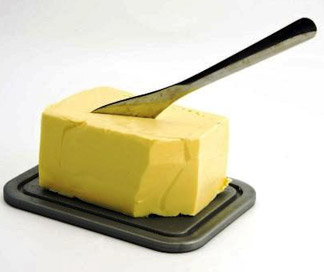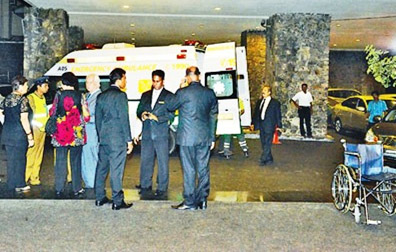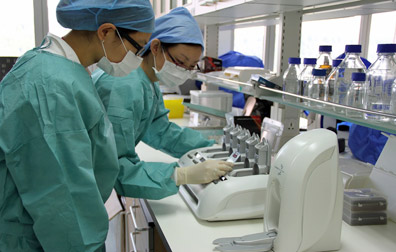It was the butter!
Or was it? Speculation still rife as to what caused
the guests to collapse at Queen Elizabeth's birthday celebrations:
by Carol Aloysius
 Speculations as to what caused 12 guests at the Queen's birthday
shindig on June 12 to be hospitalized continue, even though the
management of Cinnamon Grand, where the event was held, acknowledged
that butter was the likely culprit. Speculations as to what caused 12 guests at the Queen's birthday
shindig on June 12 to be hospitalized continue, even though the
management of Cinnamon Grand, where the event was held, acknowledged
that butter was the likely culprit.
Early this week, the hotel issued a press release stating,
"Immediately after the incident, the Cinnamon Grand sent 67 items of
food and drink for expert analysis by an independent and internationally
accredited laboratory. A report received today (June 22) revealed that
the butter served at the function may have been the cause for concern."
The hotel management declined to give further information, except to
say that "steps are being taken to further investigate the matter,
including testing at the level of the supplier and manufacturer".
 |
| |
 |
|
Picture
courtsey:itersnews.com |
A spokesperson for the hotel, when asked for more details about the
supplier/manufacturer, said instead, "The matter is of grave concern to
us and is receiving our highest priority. Every attempt is being made to
ascertain how this occurred and to ensure that an incident of this
nature is avoided in the future."
Butter sample OK
The incident however has and some positive outcomes. As articulated
in the statement, the 'unfortunate' incident has resulted in the hotel
re-assessing all their processes and procedures once again to ensure
standards remain the highest possible. "There has been an immediate
implementation of additional measures well above the required ISO
standards in processes relating to purchasing, storing and food
preparation to safeguard against a recurrence of the incident," it
further stated. Speculation had been rife that the guests had collapsed
due to some kind of toxicity caused by a malfunctioning air conditioning
system. However, the hotel authorities dismissed the speculation saying
that reports from external experts on the air quality system in the
function rooms had certified the system as being 'compliant with
applicable standards'.
Meanwhile, a spokesperson for the City Microbiological Laboratory (CML),
which comes under the purview of Dr Ruwan Wijeyamuni, Chief Medical
Officer of the Colombo Municipal Council's Public Health Division, said
the butter samples they had received "met all the parameters and were
okay."
The spokesperson further claimed the CML had received a total of 13
samples of food and beverages from the hotel, but that all the samples
had not arrived at the same time. "Some reached our lab on the day of
the incident itself. Others arrived a few days later. Since we don't
know how they were stored or their expiry date and other important
details, we cannot make a comment," she explained.
When pressed for details about the test results, the spokesperson
said ten samples were satisfactory, and three - a vegetable salad, a
crab salad and a grilled vegetable dish cooked oriental style - had
questionable results.
Coliform and E-coli
Senior Deputy Director Industrial Technology Institute (ITI),
Bandulusoma, refused to divulge any information on the test conducted by
his institution, claiming, "The ITI receives hundreds of samples of food
for testing in our labs each day. Our normal procedure is to restrict
the information and results of such tests to ourselves and the clients."
However, a spokesman for the Medical Research Institute (MRI)
confirmed the contaminated butter reasoning, claiming, "the butter was
contaminated with Coliform and E-coli organisms," but explained that the
organisms don't usually have toxic effects on those who ingest them.
"They cause diarrhoea and vomiting, only after they have entered the
gastro intestinal system," he said.
He explained that the severe reactions presented by the guests
immediately after eating their food could only have been caused by a
toxin. "Exo-toxins are substances that cause severe immediate reactions.
But we haven't found any organisms like that," he added.
Dr. Waruna Gunathillake, Head of the Poisons Information Unit,
National Hospital, refusing to comment until there was scientific
evidence to prove that the butter served was the actual cause, however,
agreed "any food item can cause acute reactions to anyone who is food
sensitive. If the reaction is very serious, we call it an anaphylactic
reaction."
He said the only manner in which butter could be contaminated with
E-coli was through water, an ingredient that goes to butter making. "If
the water used is polluted or contaminated, it can contain E-coli. Even
the use of preservatives and poor storage can cause this," he explained.
Commenting on the incident, which saw 12 of the nearly 200 guests
celebrating the Queen's birthday, collapsing shortly after celebrations
began, Dr. Gunethilleke noted that as the apex body on poisons
information, the Unit should have been informed no sooner it happened.
"But no one told us. We got the information only from the media," he
pointed out. Dr. Hemantha Herath, Director, Food and Drugs Authority,
endorsed the view. "Most of the time, when there is a case of food
poisoning, we are called to the scene too late or not at all. If we had
been informed by the hotel, we would have visited the site to evaluate
the patients."
The officials also said no interim report had been sent as yet,
though promised by the hotel. "We have asked for a report. But they have
not sent us one as yet, compelling us to depend on the media for
updates," Dr Herath said. |

